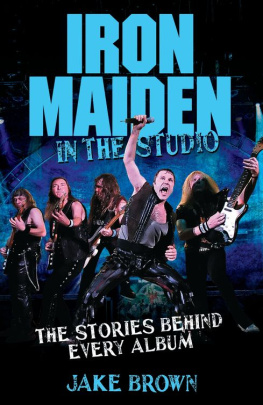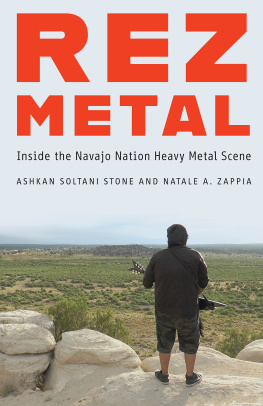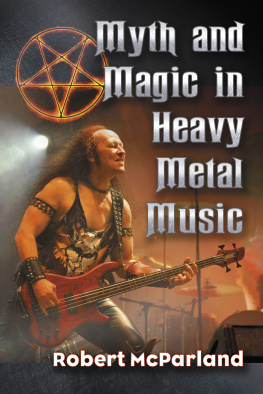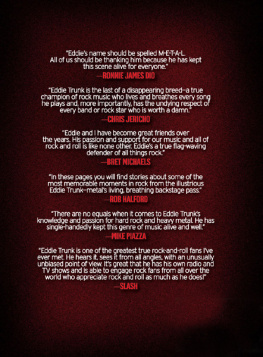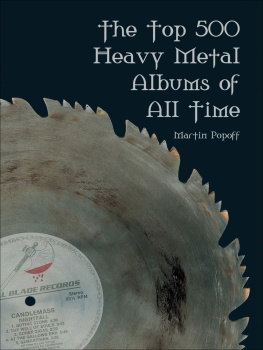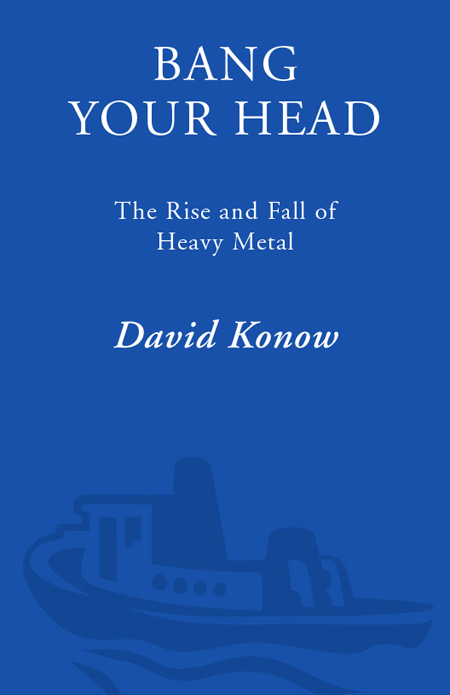INTRODUCTION
I' VE BEEN THERE AND BACK, AND I KNOW HOW FAR IT IS.
Ronnie Lane

I T WAS IN THE EARLY 1980s when I got my first taste of heavy metal. I was walking down Hollywood Boulevard with my father when all of a sudden, a car full of kids drove by, blasting some heavy metal at nuclear volume. It seemed like everyone froze when they drove by. The music had everybody's attention, and it was very exciting. My father was less impressed. They think they're cool if they play it loud, he told me.
By 1985, I was going to metal concerts on a regular basis. Every Sunday, I couldn't wait to get my hands on the Los Angeles Times, and tear through the Calendar section to see who was coming to town. Throughout the '80s, when a metal band was scheduled to play L.A., the promoters took out full-page ads in the paper announcing its upcoming arrival at such venues as the Forum, the Long Beach Arena, the L.A. Sports Arena. If it was a really big band, they could fill up the L.A. Coliseum, or Anaheim Stadium. If you were lucky enough to get tickets to a show, the wait for the actual concert always seemed like an eternity.
Once the night of a show rolled around, my parents would usually drop a friend and me in the parking lot, and pick us up after the show. They were usually pretty frightened by the sounds of shattering bottles, firecrackers, and vomiting.
I often felt like the kid in the movie Almost Famous, who is totally embarrassed when his mother drops him off at the Black Sabbath gig and reminds him, Don't do drugs! In fact, I was usually terrified my parents would come in the middle of a show and yank me out by my ear. Generally, they tolerated my teenage metal obsession, figuring it was a phase I'd soon grow out of. Usually the shows were over by 11, so they didn't have to wait too long for me. I was driving by the time Guns N' Roses had become successful, so thankfully my parents didn't have to wait until midnight before Axl Rose even appeared on stage.
On the night Mtley Cre arrived to play at the Forum for the first time in 1985, my father came along with me. And he actually enjoyed himself. I was surprised when he told me how many encores the band would perform before they even hit the stage, and how the show was structured. How did he know this stuff ? My father obviously saw what I couldn't see at the time: It was pure show biz.
My father wasn't put off by the profanity that Vince Neil spewed out during his stage raps. He says all those dirty words on stage because that's what you kids like to hear, he told me. As we were leaving for the parking lot, my father asked me, That singer guy, that's all he does? He doesn't play guitar or anything? I told him, No, Dad. He's just the singer. That's his job. You know, like Frank Sinatra? My father shot me a dubious look. To even the most untrained ear, Vince Neil was no Frank Sinatra.

In the late Sixties in England, the genre of heavy metal would mutate from the blues, continue to grow and evolve, and eventually take on a life of its own. Artists as diverse as Black Sabbath, Led Zeppelin, and many others all had their roots deep in the blues, but from its influence they would invent an entirely new sound, taking the music to a new level of sonic overkill and density, often under the moniker of heavy metal.
It's not completely certain who first used the term heavy metal as a description, but some critics have credited the Beat writer William Burroughs as the first one to use it long before the music actually came along. The legendary Lester Bangs was one of the first rock critics to describe bands such as Black Sabbath and Deep Purple as heavy metal in 1972.
The phrase also appeared in the 1968 Steppenwolf hit Born to Be Wild (songwriter Mars Bonfire claimed he heard the phrase heavy metal thunder in his high school chemistry class). However the term was derived, it became the perfect name for the sound it described. If you told people you were into heavy metal, they immediately knew what you were talking about.
Heavy metal and hard rock began developing at the same time rock and roll was becoming big business. Artists continued to break new ground while the record industry was turning into one of the biggest empires in the entertainment business. But even by the late 1960s, the music industry still wasn't entirely comfortable with the rock and roll revolution, and it certainly wasn't prepared for artists like Black Sabbath or Alice Cooper.
There were few ground rules in the music industry of the late '60s and early '70s. The people in charge of making the music, and those in charge of managing the artists, often flew by the seat of their pants. It would be a glorious time for the artists, shortly before the accountants and lawyers would take over the music business and make sales the only focus.
Although heavy metal's unique sound originated in the industrial cities of England, the decade of the 1980s saw a dramatic shift in where the new metal bands were coming from. The major record labels, with extensive operations in Los Angeles, began signing more bands from their own backyard.
In the '70s and '80s, being a rock star was the greatest job in the world. You could earn millions for playing your favorite music, sex was unlimited, sober was a relative term, and you could remain in a permanent state of adolescence. Mark Knopfler's words Get your money for nothing and your chicks for free were the M.O., pure and simple.
In the '80s, with the advent of MTV, bands like Twisted Sister and Mtley Cre would become household names. Now metal bands had hit singles right alongside pop artists like Michael Jackson and Madonna at the top of the charts.
The critics, the music industry, and often the general public at large ridiculed heavy metal and bought into the stereotype that the bands were made up of musicians who couldn't play their instruments. Looking back, some of the best, most technically accomplished musicians in history came out of the heavy metal and hard rock genres. In today's music industry, artist development seems to be a thing of the past, and careers often last no longer than a single's chart run. Yet many of the bands in this book lasted for years, and in the case of artists like Ozzy Osbourne and Van Halen, for decades.
Out of all musical genres, metal has always received the least respect. Throughout the '70s and '80s, critics doled out praise sparingly. Even though the genre sold millions of albums, the suits who ran the music business didn't like it either.
Many bands that were clearly heavy metal shunned the term when describing their music, trying to distance themselves from it. Being a heavy metal band came to be seen as limiting, and many elements of the genre would eventually cross the line into self-parody.


